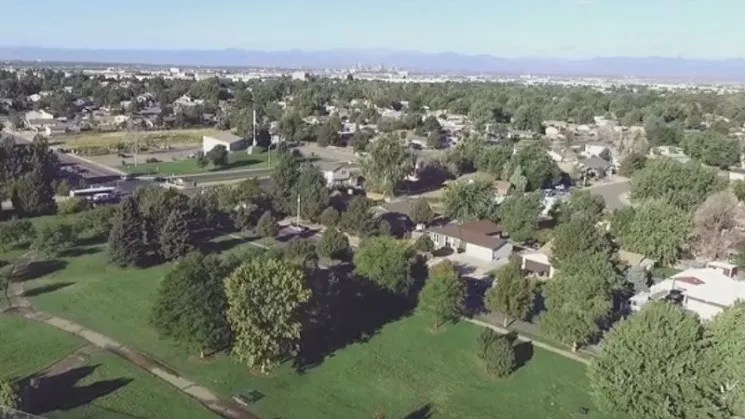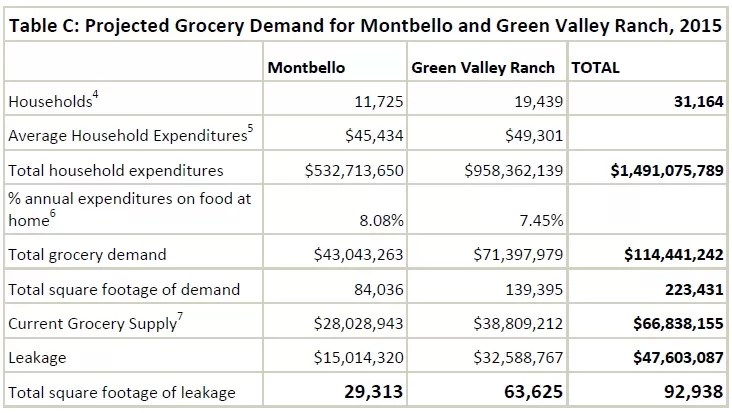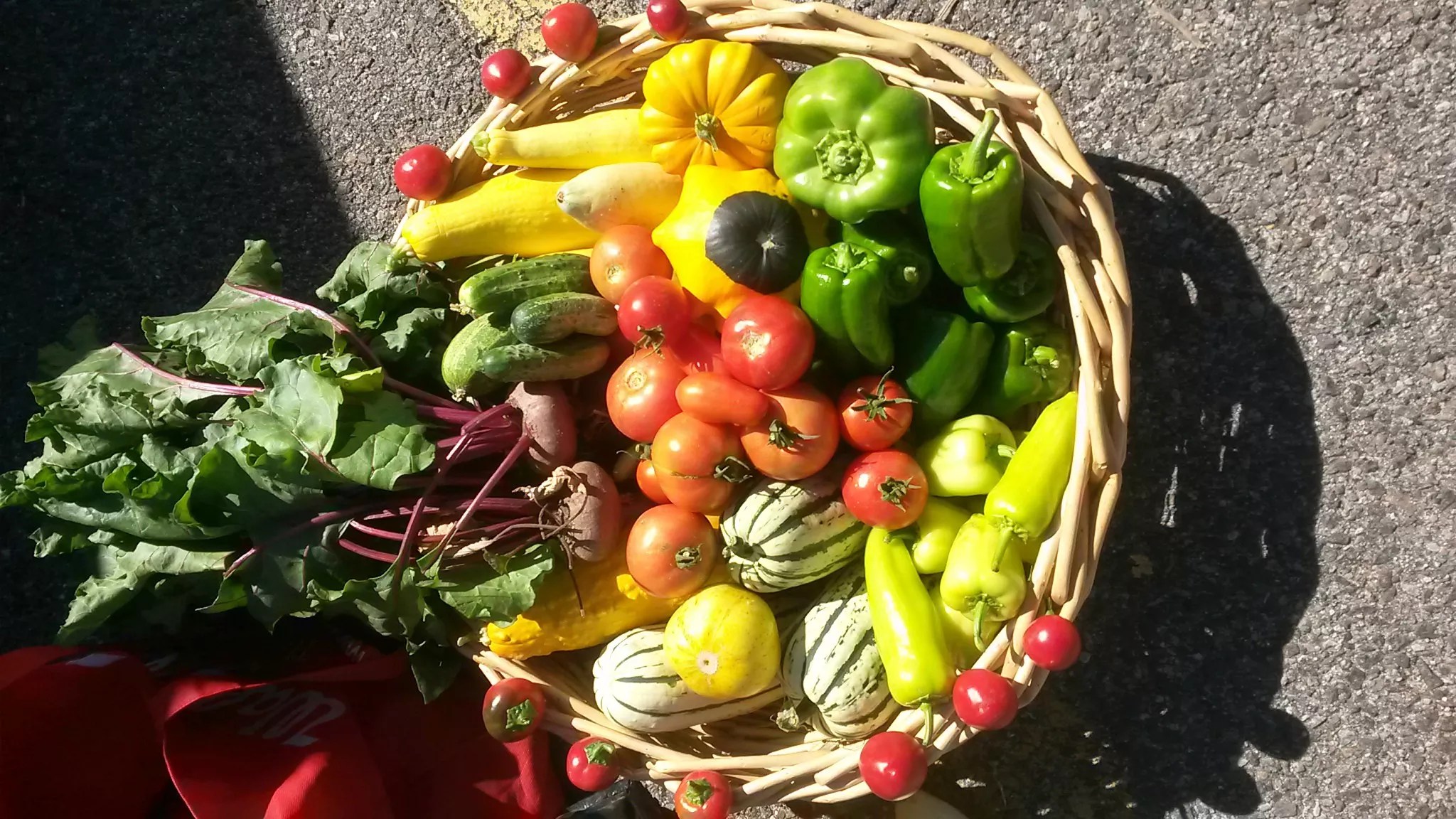
YouTube file photo

Audio By Carbonatix
In September 2016, we told you about attempts to convince a national grocery chain to build in Montbello, a diverse Denver neighborhood that qualifies as a food desert because it doesn’t have a single full-service supermarket. A year later, every major retailer approached by the community has declined to launch such an effort, even though Montbello was named America’s fastest-growing “suburb” in a survey released earlier this year.
Montbello advocates say the grocers are balking because the neighborhood continues to be linked to crime and poverty – a reputation they see as increasingly out-of-date amid Denver’s ongoing economic boom. But rather than simply accepting the firms’ decision, or railing against the racially tinged injustice of it, they’ve embarked on an ambitious project dubbed the Montbello FreshLo Initiative, which envisions a mid-sized market at the center of a cultural hub that will become a gathering place for residents who currently have to travel long distances simply to find something healthy to eat. And as a preview, they’re created a pop-up market that will take place the next two Saturdays, September 9 and 16, at a former RTD park-and-ride site near the intersection of Peoria and Albrook; details below.
The grocers’ rejections “can be frustrating,” admits Donna Garnett, the initiative’s program director. “But there’s been a lot of positive energy as a result of people in the community feeling that they’ve taken control – that we’re doing this ourselves and not just waiting for some national chain or developer to wave a magic wand over us.”
Adds Terry Liggins, executive director of the Montbello Organizing Committee: “People are excited to be part of something like this. We’ve always had a lot of pride in our community, a lot of resilience and a lot of fight – and I think we’re all up for the challenge of doing it ourselves.”

An artist’s rendering of the Montbello grocery-based cultural hub project.
Montbello Organizing Committee
While Montbello is home to a small Walmart Neighborhood Market, there’s plenty of pent-up demand for a larger facility. “The closest one is the King Soopers in Green Valley Ranch,” Garnett says, “and if you ask people how they get there, they’ll tell you, ‘I take two buses, and it takes me about an hour to get there and an hour to get back’ – and they have to carry their groceries on the bus. That’s unacceptable. It makes no sense.”
The Montbello team certainly did everything they could to persuade grocers that opening a supermarket in the area would be good for both residents and their bottom line.
“We worked with about 2,500 participants, who took part in a dialogue that lasted for about fifteen months,” Garnett points out.
These conversations resulted in a document called the Montbello Market Scan Report – it’s accessible below – that presents a strong, data-based argument for why the time is now to put a supermarket in the neighborhood. Note the following graphic, which shows that so-called “leakage” – grocery-buying power in Montbello and Green Valley Ranch that’s not being utilized locally – topped $47 million in 2015.

Montbello Organizing Committee
Clearly, there’s money to be made in Montbello – but not a single grocer decided to make a play for it. When asked about the chains’ objections, Garnett mentions “the demographics and the perception of what people are interested in.”
Adds Liggins: “They also talked about the educational level of our residents and those types of things.”
If Garnett sees these excuses as coded language about the high percentage of Latinos and African-Americans who live in Montbello, she doesn’t mention it. But she does say that “in light of the data coming out of the Market Scan Report, we believe these grocers have been listening to the hype – looking at old data instead of looking at the development happening so quickly in and around our community.”
“We’re now being recognized as the hottest spot in Denver as far as property values,” Liggins allows. “So we know that in the very near future, the grocery stores will realize the narrative they used wasn’t true, and they will then be very interested in our community.”
But waiting for such a day isn’t an option, because the difficulty of obtaining nutritious food in Montbello is literally making people sick. “There are a lot of health disparities in the community,” Garnett says. “We have high incidents of diet-based health problems like obesity, kidney failure.”
With such concerns in mind, the Montbello activists came up with an idea for a market that would directly address residents’ well-being, with special sections designed for those suffering from diabetes, for example, and an on-site nutritionist who could help teach locals to eat healthier. And they decided to make it the centerpiece of a development that could address other community deficiencies as well.
“We’re not just a food desert,” Liggins maintains. “We’re a multi-level desert. We don’t have a hub where folks can meet. Montbello High School went away, the park-and-ride went away. So we’ve taken the approach of not just focusing on a grocery store, but also addressing a lot of the other deserts we have in the community, too.”

Some of the produce that will be available at the Montbello pop-up market.
Photo by Khadija Haynes
Hence the aforementioned initiative, whose “FreshLo” name puts an emphasis on “fresh” and “local.” In addition to a grocery store, Montbello planners envision a performance space that can host concerts, theater companies and more.
The concept caught the attention of both the Kresge Foundation and the Colorado Health Foundation, which funded the initiative’s planning stage, as well as Family Tree Market, which is working with Montbello officials to develop the market notion. Realizing it won’t be cheap, Garnett acknowledges, “With our back-of-the-envelope estimate in terms of purchasing land, renovations and other expenses, we’re looking for something in the vicinity of eight to ten million dollars.” But given the changes taking place in Montbello right now, not to mention that attention-getting Realtor.com survey that dubbed the neighborhood the nation’s hottest suburb, both she and Liggins are optimistic that financing can be obtained.
Meanwhile, they’re thrilled by the early success of the pop-up market, which debuted on Saturday, August 26 at the Peoria/Albrook site, and they expect the attendance to rise over the final two weekends thanks to positive word-of-mouth.
“It’s not just a farmers’ market,” Garnett stresses. “It’s actually an open-air grocery through Family Tree Market. We have meat, dairy products and dry goods, as well as fresh fruits and vegetables.”
Montbello residents will be able to shop at the pop-up market from 9 a.m. to 2 p.m. this Saturday, September 9, and during the same hours on September 16. As a result, locals won’t have to take that long bus ride to the Green Valley Ranch King Soopers for a couple of weeks – and Liggins and Garnett hope the market will provide a taste of better food options to come.
Click to read the complete Montbello Market Scan Report.